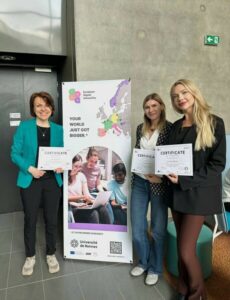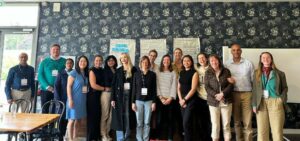 From May 19 to 23, 2025, representatives of Vasyl Stefanyk Precarpathian (Carpathian) National University participated in the International Staff Week, hosted by the University of Rennes (Université de Rennes, France), within the framework of the European University Alliance EDUC – European Digital UniverCity.
From May 19 to 23, 2025, representatives of Vasyl Stefanyk Precarpathian (Carpathian) National University participated in the International Staff Week, hosted by the University of Rennes (Université de Rennes, France), within the framework of the European University Alliance EDUC – European Digital UniverCity.
The event brought together approximately 50 participants from higher education institutions across Poland, Hungary, the Czech Republic, Germany, Norway, the United Kingdom, Canada, Italy, Spain, Japan, Georgia, and other countries, fostering international dialogue and institutional cooperation.
The following staff members represented the university: Tetiana Solodzhuk, Head of the Project Management Department; Tetiana Korniienko, Head of the Document Management and Records Department and a Junior Researcher on the EDUC-WIDE project; and Anastasia Hrytsak, Leading Specialist in the International Relations Department.
The program was structured around three thematic areas identified as strategic priorities for collaboration and exchange: Finance and Administration, Libraries and Open Science, and International Relations.
The programme included participation in thematic sessions, interactive workshops, and presentations on EU and French higher education policies. In addition, participants had the opportunity to visit various facilities of the University of Rennes, including its campuses, libraries, research centres, art centres, and sports complexes.
As part of the Finance track, participants explored European Union policies, available funding instruments, and best practices for securing financial resources within European universities. Key topics included risk management, as well as the organisational and technical aspects of financial oversight and project administration.
Particular emphasis was placed on integrating sustainability and cost-efficiency principles into financial management. The University of Rennes was presented as a model institution for applying responsible renovation practices and strategic real estate management, showcasing practical solutions that align with environmental and fiscal responsibility.
Within the Libraries and Open Science track, participants were introduced to the open science policies of both the University of Rennes and the French Ministry of Higher Education and Research, with a focus on their implementation at both national and institutional levels.
Special attention was given to: open-access publishing practices, particularly the Diamond Open Access model; the preservation and sharing of scientific data; the development of infrastructure supporting open science; the strategic role of university Libraries and Library Consortia in negotiating with academic publishers.
Discussions also addressed the use of copyright management tools, digital repositories, and Persistent Identifier (PID) systems, as well as the broader impact of open science on academic integrity and the promotion of a culture of openness within the university environment. Within the framework of the International Relations track, participants examined the strategic development priorities of the University of Rennes in the context of ongoing transformations within the European higher education landscape.
Special focus was given to strategies for enhancing the internationalisation of the educational process, the expansion of academic mobility programs, mechanisms for attracting international students and faculty, and the promotion of intercultural dialogue and cooperation within university communities. In addition, the group analysed institutional models for managing global engagement, exploring best practices in coordinating universities’ international activities.
Participation in the International Staff Week serves as an essential step toward strengthening international cooperation at Vasyl Stefanyk Precarpathian (Carpathian) National University, advancing the implementation of European open science practices, enhancing the efficiency of financial and project management, and supporting the university’s deeper integration into the European Research Area (ERA).


